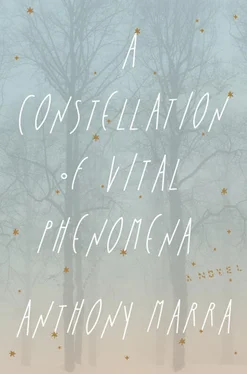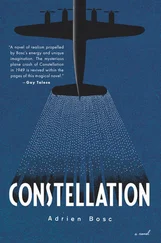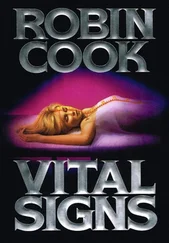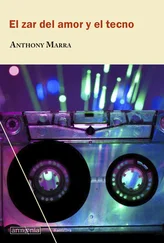“It’s like scaffolding,” he said, the first words in many kilometers.
“Built by the street kids that live in the ruins,” she said, and in a tone of apology added, “You were smart to bring her in.”
No faces peered from the yawning walls. The thought of his dreary, soul-crushingly backward village sent an unfamiliar flare of pride up his chest.
“How do they survive?” he asked, glancing at a building with more plank bridges than floors. An ingenious strategy; these young engineers were clearly ethnic Chechen. Collapsed floors would take construction crews years to lift and rebuild, but plank bridges could be reassembled in minutes.
“They sell the rubble back to the Russians. Construction has begun on defense and petroleum ministry buildings. They buy back the bricks at two rubles each.”
“More than I would have thought.”
“Bricks purchased at dawn are cemented by noon, so the kids have to chisel off any remaining mortar. You see those white rubber casings in the rubble?”
“Like snake skins.”
“It’s electrical wire insulation. They strip and sell the copper wire. Just about any metal is worth its weight. Most of these kids can’t read or write, but they’ve created metal-based currencies.”
“Scrap metal and disappearances,” Akhmed said, flat and without irony. “Our national industries.”
The warehouse stretched wider than a soccer field with half its windows stained tar-black and the other half blown out, and when Sonja nodded to it he knew something was wrong. They passed a toppled chemical drum, its top peeled back like a bean-tin lid; a glowing blue sludge, too thick to evaporate, pooled at the bottom. A guard blocked the warehouse drive. His bloodstained bandoliers intersected at the sternum, the only red cross Akhmed would see that day. A dull glint, less recognition than knowing, appeared in the guard’s face when he saw Sonja. “Only a fool would sit in a truck,” the woman had said; if only Akhmed had met her a day earlier. The vise tightening in his chest had been there since the morning, since Sonja had refused to acknowledge him. She parked the truck, went to find the snow leopard — thief, and he was alone, brought by a woman who didn’t trust him to a warehouse large enough to hold his village, a place where he shouldn’t have been, in a city unworthy of even an imaginary plane ticket. Three Mercedes sedans sat at the center of the warehouse floor, Scandinavian license plates hanging from shiny screws. The walls were Western department stores: racks of leather and fur coats, refrigerators and dishwashers with warranties dangling from plastic ribbons, cardboard boxes stacked two stories high. A folding chair sat open on the floor, pliers and duct tape on the seat. A faucet turned on in Akhmed’s mouth.
“It was the most remarkable thing I’ve seen in years. I couldn’t think. I was stunned. Do I bow? I didn’t know what to do.” The thin, excited voice belonged to the thin, excited man entering the warehouse beside Sonja. “I never thought I would meet someone from China.”
The two strolled with a familiarity — she touching his shoulder, he timing his footsteps to hers — that left Akhmed uncertain and unaccountably envious. The wide arc they walked around him drew a line of tension across the room. “What was he doing here? A journalist?” Sonja asked, avoiding his eye.
“An oil man. He wants to buy a refinery.”
“You’re selling refineries now?”
“Just the machinery,” the man said simply. He wore a beige summer suit and a white dress shirt unbuttoned to exhibit a triangle of voluminous chest hair. His loafers reflected the pale light. A man dressed like this would be stripped, hog-tied, and beaten within one city block, but he didn’t seem like the type of man that went anywhere alone. “Is this our friend?” the man asked, and nodded to the folding chair, pliers, and duct tape. “Have a seat, please.”
Akhmed pivoted sharply, but the guard was behind him, the gun barrel leveled to his chest. A tourniquet gripped the corridor between his brain and body, and directions came to his limbs in halting dribbles that wouldn’t save him. That morning Ula had been asleep when he left. He hadn’t said good-bye to her.
“You haven’t been honest, Akhmed,” Sonja said. The way she studied him he knew his skull was just another bone she could amputate.
“I’m sorry,” he gushed. “I lied about being in the top tenth of my graduating class. I was in the bottom tenth. In the fourth percentile.”
No relief in her smile. “Do you think that’s what this is about?” she asked.
What else could it be? The only lie he had told was that he was a good doctor.
“You knew my surname and patronymic, Akhmed.” She had said his name twice now. The third time would be the last. “No one knows those. But you did.”
“She wouldn’t even tell me,” the man offered. “Not that I had difficulty finding out, but still, she’s rather cautious, don’t you think?”
“You have to explain yourself,” she said, and she paused for a breath. “Or I’ll leave you here. I can’t risk having an informer on my staff.”
Had the gun barrel not pressed against his spine, he would have laughed. He would have treated the setup as another one of Sonja’s tests. Treated the whole thing like the misunderstanding it was, because how could she mistake him for the man he had saved Havaa from? Havaa. The thought of her shucking the insulation from electrical wires reconnected his nerves. He couldn’t swallow. In the mouthful of warm saliva a pearl formed; an irritant hardened into white gleaming fury at the possibility that the war would end his life as indifferently as it had a hundred thousand others, that he was no more privileged. He didn’t want to die before an audience of stolen refrigerators. He had kissed Ula’s forehead in the early morning and felt the flutter of her lashes on his chin but when he raised his face she had already gone back in the gentle wash of wherever it was she went when she wasn’t with him. He hadn’t said good-bye.
“I saw your work before I ever met you,” he explained. “The rebels, they came to my village a few years back, and the field commander had a chest held together by the most magnificent dental-floss stitches. I was so impressed. The commander said it was the work of a Russian woman and I assumed they had kidnapped a Russian medic. But then, later on, I met a refugee from Volchansk who used to work at the hospital. She had stayed with Dokka when he was running a hostel for refugees.”
“What was her name?” Sonja asked, eyes as fixed as constellations. She stood close enough for him to hear her teeth grind. There was so much of her, right here, in his face, and he would have stepped back, had a gun not pushed him forward.
“I mentioned the dental floss and the Russian woman doctor. It was only in passing. I wanted to know if the hospital was hiring. And she looked up and said, ‘Sofia Andreyevna Rabina. Sonja.’ I tried to ask her more, but she didn’t want to talk about you. Your name was the only one I had when Dokka disappeared. I thought a doctor good enough to stitch a man with dental floss would be good enough to take in Havaa.”
“What was her name!” she demanded. He was afraid to answer, afraid even to exhale; the hope wrapped within the question was so small and flickering a breath could extinguish it.
“Was it Natasha? Was her name Natasha?”

TALL, SWAN-LIKE, AND four years her sister’s junior, Natasha stood in the spotlight of her family’s affection. In his daybreak voice, cold from seven hours without the heat of a cigarette, her father would offer her good-morning first, even if she entered the kitchen two paces behind Sonja. Her mother treated her with the pride and envy of a woman who had fallen in love with sixteen boys in secondary school, none of whom reciprocated her affection. “My Natasha,” she would say, running her fingers through the girl’s long brown hair with a possessiveness suggesting the strands were an extension of her own. Natasha’s eyes were brown spattered with glimmers of emerald and uncut diamond. Hazel, technically. Her mother stared in quiet awe of this more artful rearrangement of her genetic code, and slipped into a contentedness that usually appeared only after the red wine had fallen below the bottle label. Natasha’s elevated station in the family left in her only the slightest scratches of arrogance. Better than anyone, she knew she had done nothing to deserve the beauty she was blessed with. Their parents’ plain features, replicated predictably in Sonja, had reacted violently in Natasha to create something as surprising as a dove hatching from a pigeon egg.
Читать дальше












